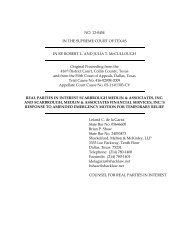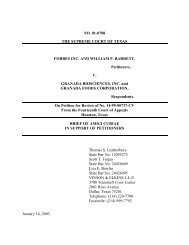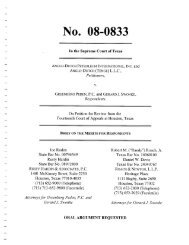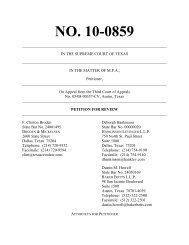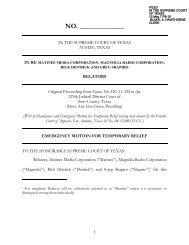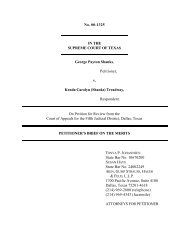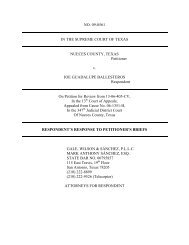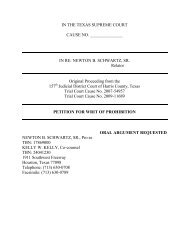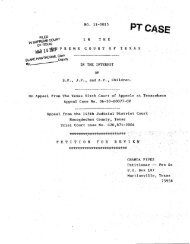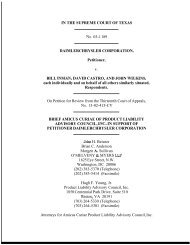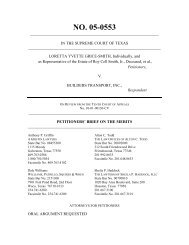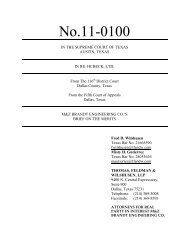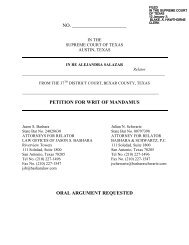Petition for Writ of Mandamus - Filed - Supreme Court of Texas
Petition for Writ of Mandamus - Filed - Supreme Court of Texas
Petition for Writ of Mandamus - Filed - Supreme Court of Texas
You also want an ePaper? Increase the reach of your titles
YUMPU automatically turns print PDFs into web optimized ePapers that Google loves.
Final Reports<br />
An entity that ceases doing business in <strong>Texas</strong> <strong>for</strong> any reason<br />
(i.e., termination, withdrawal, merger, etc.) is required to<br />
file a final franchise tax report (Forms 05-158-A and 05-<br />
158-B, 05-163 or 05-169) and pay any additional tax, if due.<br />
Due Date<br />
A final report is due 60 days after the entity ceases doing<br />
business in <strong>Texas</strong>.<br />
Accounting period<br />
Accounting Year Begin Date:<br />
The day after the end date on the previous franchise tax<br />
report.<br />
Accounting Year End Date:<br />
The date the taxable entity ceases doing business in <strong>Texas</strong>.<br />
For a <strong>Texas</strong> entity, the end date is the effective date <strong>of</strong><br />
termination, merger or conversion into a nontaxable entity.<br />
For a non-<strong>Texas</strong> entity, the end date is the date the entity<br />
ceases doing business in <strong>Texas</strong>.<br />
Example: A <strong>Texas</strong> entity filed a 2012 annual franchise tax<br />
report using a 12-31-11 accounting year end date. The entity<br />
wants to end its existence on 08-03-12. To obtain a certificate<br />
<strong>of</strong> account status <strong>for</strong> termination, the entity must file a final<br />
report and pay tax <strong>for</strong> the accounting period from 01-01-12<br />
through 08-03-12. If the entity is not terminated until 08-16-<br />
12, the entity must file an amended final report. The<br />
amended final report is due the 60th day after 08-16-12,<br />
the date the entity terminated.<br />
Taxable entities must satisfy all tax requirements or state in<br />
the appropriate articles which entity will be responsible <strong>for</strong><br />
satisfying all franchise tax requirements be<strong>for</strong>e they may<br />
terminate legal existence in <strong>Texas</strong>. All documents required by<br />
the <strong>Texas</strong> Secretary <strong>of</strong> State to terminate legal existence in<br />
<strong>Texas</strong> must be received in that <strong>of</strong>fice be<strong>for</strong>e 5:00 p.m. on Dec.<br />
31 to avoid liability <strong>for</strong> the next annual franchise tax report. If<br />
Dec. 31 falls on a weekend, the documents must be received<br />
by 5:00 p.m. on the last working day <strong>of</strong> the year. Postmark<br />
dates will not be accepted. You may refer to<br />
wvvw.wi n d ow. state .tx. u s/taxi nfo/fra nch ise/ta x_req_sos htm I <strong>for</strong><br />
more in<strong>for</strong>mation on filing requirements. This section does not<br />
apply to financial institutions.<br />
Non-<strong>Texas</strong> entities that have not registered with the SOS<br />
<strong>of</strong>fice, but have been doing business in <strong>Texas</strong>, must satisfy<br />
all franchise tax requirements to end their responsibility <strong>for</strong><br />
franchise tax. The entity must notify the Comptroller's <strong>of</strong>fice<br />
in writing and include the date the entity ceased doing<br />
business in <strong>Texas</strong>.<br />
Combined Groups<br />
If every member <strong>of</strong> a combined group ceases doing<br />
business in <strong>Texas</strong>, a final report will need to be filed and<br />
paid be<strong>for</strong>e a taxable entity will receive clearance from the<br />
Comptroller <strong>for</strong> termination, cancellation, withdrawal or<br />
merger. In all other cases, a combined group will not file a<br />
final report.<br />
Except as provided below, if the entity that ceases doing<br />
business in <strong>Texas</strong> is part <strong>of</strong> a combined group, the data<br />
that should be reported on the final report will be included<br />
in the combined group's report <strong>for</strong> the corresponding<br />
accounting period. The entity should use Form 05-359,<br />
Request <strong>for</strong> Certificate <strong>of</strong> Account Status to identify the<br />
reporting entity <strong>of</strong> the combined group.<br />
An entity that joins a combined group and then ceases doing<br />
business in <strong>Texas</strong> in the accounting year that would be<br />
covered by a final report is required to file a final report <strong>for</strong><br />
the data from the accounting year begin date through the<br />
date be<strong>for</strong>e it joined the combined group. The period<br />
beginning with the date the entity joined the combined group<br />
through the date the entity ceased doing business in <strong>Texas</strong><br />
will be reported on the combined group's annual report <strong>for</strong><br />
the corresponding period.<br />
A member <strong>of</strong> a combined group that leaves the combined<br />
group and then ceases doing business in <strong>Texas</strong> during the<br />
accounting year that would be covered by a final report is<br />
required to file a final report <strong>for</strong> the data from the date the<br />
entity left the combined group through the date that the entity<br />
ceased doing business in <strong>Texas</strong>.<br />
Change in Accounting Period<br />
<strong>Texas</strong> law does not provide <strong>for</strong> the filing <strong>of</strong> short period<br />
franchise tax reports. A change in a federal accounting<br />
period or the loss <strong>of</strong> a federal filing election does not change<br />
the begin and end dates <strong>of</strong> an accounting period <strong>for</strong><br />
franchise tax reporting purposes. The keys to the period<br />
upon which the tax is based are the begin and end dates.<br />
The begin date will be the day after the end date on the<br />
prior franchise tax report, and the end date will be the last<br />
federal tax accounting period end date in the year prior to<br />
the year in which the report is originally due. There<strong>for</strong>e, a<br />
change in a federal accounting period may result in an<br />
accounting period on the franchise tax report <strong>of</strong> more or<br />
less than 12 months.<br />
Example 1: A fiscal year entity changes its accounting year<br />
end from 09-30-11 to a calendar year end <strong>of</strong> 12-31-11.<br />
Because <strong>of</strong> the change in the federal accounting period,<br />
the entity is required to file a short period federal return<br />
covering the period 10-01-11 through 12-31-11. For<br />
franchise tax reporting purposes, the entity would file its<br />
2012 report based on the period beginning 10-01-10 through<br />
12-31-11, combining the relevant in<strong>for</strong>mation from the two<br />
federal income tax reports.<br />
Example 2: A calendar year entity lost its S election under<br />
the Internal Revenue Code on June 27, 2011. As a result,<br />
the entity was required to file a short period federal S return<br />
<strong>for</strong> the period 01-01-11 through 06-27-11. The entity did<br />
not change its accounting year end and filed a second short<br />
period federal return <strong>for</strong> the period 06-28-11 through<br />
12-31-11. For franchise tax reporting purposes, the entity<br />
would include the period 01-01-11 through 12-31-11 on its<br />
2012 annual report and would combine the relevant<br />
in<strong>for</strong>mation from the two federal reports.<br />
5



